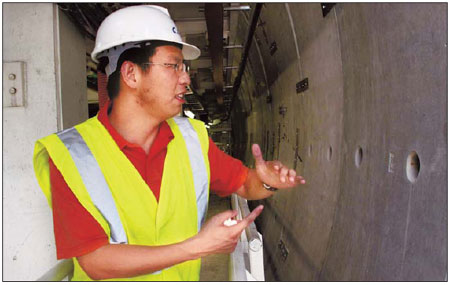Top News
High-speed rail will set the pace in Turkey
Updated: 2011-07-13 07:34
By Zhang Haizhou (China Daily)
|
|
Springboard to Europe
Despite those challenges, Zheng said the 158-km project is very significant for the company and the development of Chinese high-speed rail overseas. "We consider it a springboard to enter the European market."
And it will produce "zero" financial profit for his company, he said.
But Zheng, who has spent more than a decade building railways abroad, also said China should take a measured pace in trying to push its technology into the European market.
Take Bulgaria, for example. Alexander Tsvetkov, then Bulgaria's minister of transport, announced in early November that Sofia had been invited to join the project for high-speed rail from China through Turkey and Bulgaria to central and western Europe.
Zheng admitted his company hopes to extend its business to Bulgaria, but he said it's still too early for a concrete plan or project.
"I think it's better to be slow," he said. "It's a fresh market, and there are many rules in the European market. Like in Turkey, I still cannot say I understand everything, though we began here in 2004."
Some European high-speed rails have noticed China's designs on the European market. "China is about to rise to a true global competitor," said Alexander Machowetz, a spokesman for Siemens Industry Sector in Germany.
Machowetz said Siemens "acknowledges the ambitious goals of the Chinese manufacturers in the international markets", but he also said his company has been "very successful" as a supplier of high-speed rail technology in the Chinese market over the past few years.
"International competition and cooperation in project-based partnerships" are common in railway projects, he said, but "Siemens has proven its ability to cope with competition of any kind".
Hiring locally
Construction of Phase 2 began in 2008, but China Civil Engineering started its preparation as early as 2004 to win the bid for the project. Thirty companies, including some from Japan, South Korea and Europe, formed eight partnerships in the competition.
China Civil Engineering's partnership, with China National Machinery Import & Export Corp and two Turkish companies, Cengiz and IC Ictas, won the bid in December 2005. The contract was signed in July 2006.
A total of $1.27 billion was raised from both countries. China contributed $720 million in loans.
Now more than 1,000 laborers, technicians and support staff are working on the project. Just over 40 are from China, Zheng said. "We hope in the future to have only a few senior Chinese administrative staff here, leaving all other jobs to local people."
Talking about its future here, Zheng said the company is in discussion with Turkey about building a 2,000-km high-speed railway linking the border towns Edirne in the northwest, close to Bulgaria and Greece, and Kars in the northeast, near Georgia and Armenia.
"We are discussing with them. We want to cut the project into different phases and construct them one by one," he said.
Turkish State Railways, which is in charge of the country's HSR development, had not responded by deadline to a China Daily interview request on whether China would get more projects.
But according to the agency, Turkey plans to construct some 6,000 km of high-speed railway by 2023, the country's 100th anniversary.
The Ankara-Istanbul line is the country's first high-speed line. Phase 1, which runs more than 200 km from Ankara west to Eskisehir, was built by a Spanish company and opened in early 2009.
When the entire line opens, travel time between Ankara and Istanbul, the country's two largest cities, will shorten from seven hours to less than four.
Sino-Turkish ties
"HSR is just a beginning for further economic cooperation" between Turkey and China, said Selcuk Colakoglu, director of Asia-Pacific Studies at Ankara-based International Strategic Research Organization.
"Turkey has transformed itself from a security state to a trading state during the past decade. If you want to be a trading state, you should have a very developed transportation link." Colakoglu added that building HSR links throughout Turkey is "very important for a sustainable rapid development".
China's support in Turkey's high-speed rail would be "beneficial for both Beijing and Ankara", he said. "China seems a best alternative to build HSR with high-tech and reasonable cost, including financial support. I believe that some other strategic cooperation would follow construction of HSR."
Xiao Junzheng, political counselor at the Chinese Embassy in Ankara, said the $1.27 billion Phase 2 of the Ankara-Istanbul high-speed line is the two countries' biggest cooperative construction project.
"The project has enhanced the confidence of the Turkish government and market in Chinese technology," Xiao said.
He said the project will not only deepen Sino-Turkish economic cooperation, but also will bring "significant" benefits to Turkey's economic development. For example, Xiao said, the number of rail passengers between Ankara and Istanbul is expected to rise from 4,000 daily to 25,000 when the high-speed railway opens.
When asked if China would aim at more HSR projects in Turkey, Xiao said, "The Turkish market is a very big one, so it is not possible for it to be dominated by any single country or company. Also, the investment would be really big.
"China is just a latecomer in the construction market here," he said. "South Korea, Japan and Russia are all more active. But I believe Chinese companies can stand firm in Turkey's construction contract market with their technology strength and good credit."
Stefaan Van Kerchove contributed to this report from Brussels.
(China Daily 07/13/2011 page1)
E-paper

Ringing success
Domestic firms make hay as shopping spree by middle class consumers keeps cash registers ringing in Nanjing
Mixed Results
Crowning achievement
Living happily ever after
Specials

Ciao, Yao
Yao Ming announced his retirement from basketball, staging an emotional end to a glorious career.

Going the distance
British fitness coach comes to terms with tragedy through life changes

Turning up the heat
Traditional Chinese medicine using moxa, or mugwort herb, is once again becoming fashionable

